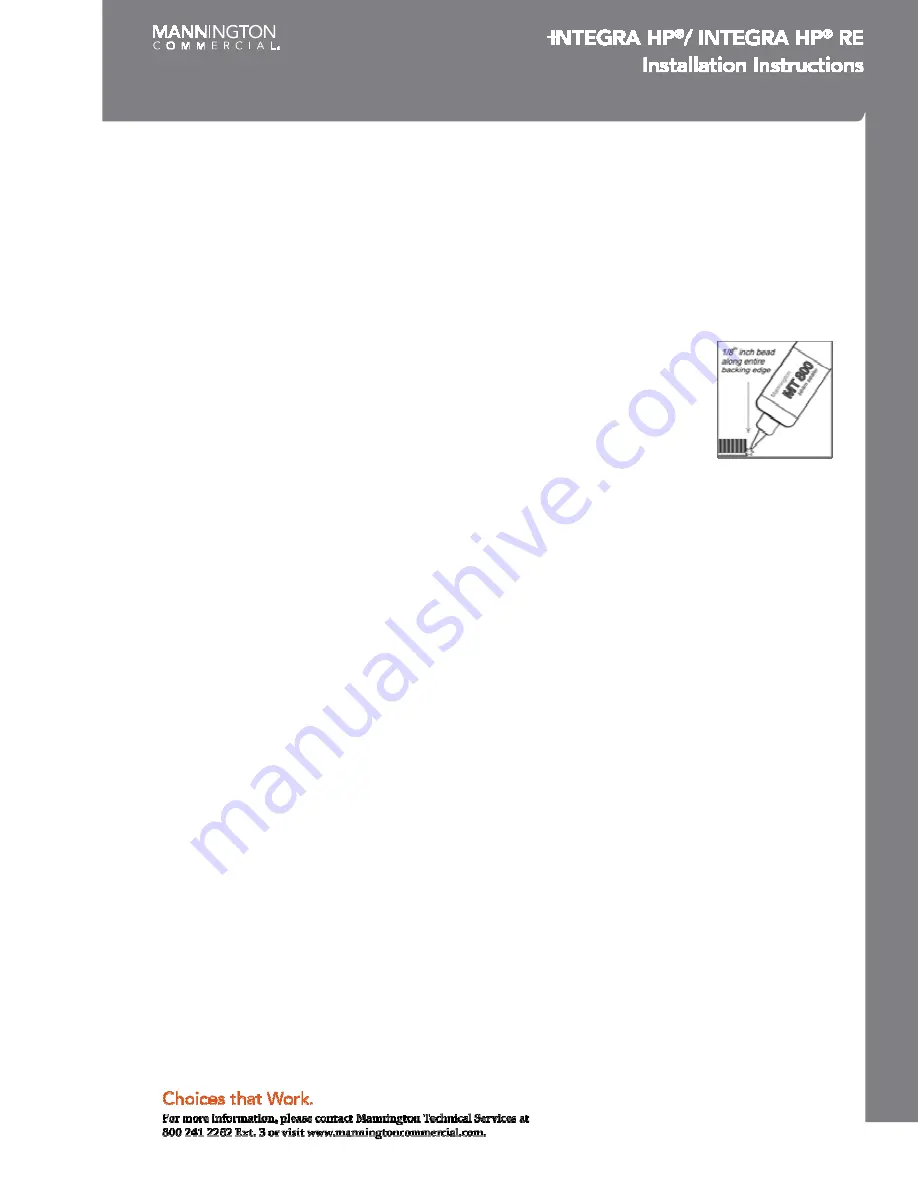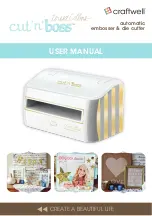
for moisture to escape sufficiently for the adhesive to develop a full bond that comes only with drying and curing.
Subfloor porosity, temperature and humidity levels can have a major impact on adhesive set up or cure times.
• Delayed grab: The wet set properties of Integra 2 will delay grab or tack until the adhesive can begin to cure. When
patterned carpet styles are stretched into alignment, use stay nails to hold carpet in place until adhesive is fully set. Please
note that Integra 2 wet set adhesive may require three or more days to develop a solid bond.
• Spread rate: Once seam edges are trimmed, carefully fold back seams on half of carpet width to expose subfloor. Apply
Integra 2 adhesive with a 1/16x1/16x1/16 inch square notch trowel. The square notches are 1/16 wide, 1/16 deep, and
1/16 apart.
• Coverage: Spread rate should cover about 15 square yards per gallon on smooth subfloor surfaces. Coverage will be less
over rough or more porous subfloors and more adhesive will be required.
• Roller: Each carpet width installed must be thoroughly rolled with a 35-75 pound 3 section roller immediately after being
placed into adhesive to remove air pockets and ensure adhesive transfer. Push roller away from seam to
avoid breaking sealer bond.
IMPORTANT NOTE:
Mannington adhesives are specifically formulated to be fully compatible with
backings, chemistry and to maximize the performance of Mannington products. Using substitutes
or failing to use Mannington adhesives as recommended can cut short product life, cause
installation failure and /or lead to a chemical reaction such as hydrolysis which can permanently
damage the backing and
will void all applicable warranty coverage.
SEAM SEALER:
All seams must be chemically welded with Mannington MT-800 seam sealer to
assure performance and maintain full warranty coverage. MT-800 should be used as follows:
• Correct flow. Fill applicator bottle with MT-800. Adjust flow control nozzle to deliver consistent 1/8 inch bead (backing
thickness).
• Placement. Apply a consistent 1/8 inch bead of MT-800 along HP backing edge first once carpet width is placed into
adhesive. Take care to avoid getting seam sealer onto carpet face fiber.
• Making seams. Place second carpet width into adhesive so two carpet widths come together with slight compression to
form a tight seam.
• Sealer precaution. The entire seaming process must be completed within 10 minutes to avoid having MT-800 seam sealer
harden too soon.
• Remove excess. Quickly clean away any excess MT-800 pushed up into the face fiber. MT-900 seam cleaner should be
used to remove excess MT-800 while the sealer remains wet.
• Technique. Dampen a clean white absorbent cotton cloth with MT-900 and gently rub the seam where sealer has
surfaced. Do not pour seam cleaner directly on the carpet. Use this final step as final check to make sure seam is tight and
properly sealed.
• Coverage. Expect a 1/8 inch bead to yield approximately 500 linear feet of seams per pint.
STAIRWAYS
: Integra HP backings will resist conforming to a tight bend necessary for some applications, but can be
successfully installed on many stairways with the following techniques:
• Separate cuts. Carpet with either HP backing can be cut to fit each step and riser. Apply adhesive to carpet
backing
and step/riser.
• Stair nosing. Use an appropriate stair nosing to cap carpet edges.
TRANSITIONS
• All carpet products must be properly protected when transitioning to other floor covering or exposed stopping
points
.
The use of a transition molding or protective strip covering the carpet edge at ½” is required. If a transition
cannot
be
utilized the carpet nap must be level or slightly below the adjacent floor. The carpet edge must be fully
seam
sealed to protect from raveling or damage.
PROTECT INSTALLATION
• Use Masonite or plywood during furniture move-in. If additional protection is required to prevent damage by other
finish trades use bonded craft paper, which will allow adhesives to cure without risk to the new installation. Avoid
using plastic sheeting to protect any installation. Coverings with pre-applied adhesive can leave sticky residue,
cause rapid soling,
and should not be used to protect the installation.
January,2018























